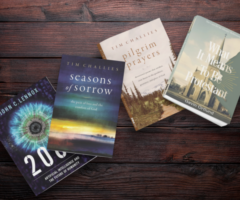Do you remember the weeks and months leading to the release of Peter Jackson’s The Return of the King? Do you remember the buzz and anticipation that reached its crescendo in December of 2003? We had already enjoyed The Fellowship of the Ring and The Two Towers, films that had transported us to Middle Earth and gotten us deeply engaged in Tolkien’s world, characters, and lore. We knew it had all been leading to this—to the journey into Mordor, to the ascent of Mount Doom, and to the culminating battles between the forces of good and the forces of evil. We were ready. We were waiting. We were excited.
What none of us felt in the lead-up to the final film was fear or dread. We did not fear or dread the film because we knew it was right that a story that had begun should come to its close. We may have felt an element of sorrow that the story was ending and we would need to bid farewell to characters we had come to love, but we knew that it was good for us to come to its final chapter. And we longed to see and experience it.
There are many people who live in fear of old age, many who live in dread of reaching their twilight years. And in many ways this is understandable, for age brings with it inevitable sorrows and challenges. Life’s later years are rarely life’s easiest years, nor its least problematic. They bring the diminishing of abilities, the loss of friends, the narrowing of life’s borders. The Sage spoke truly and universally when he said “the doors on the street are shut … terrors are in the way … the grasshopper drags itself along,” and so on (Ecclesiastes 12).
Yet these years are also precious in the eyes of God and are meant to be embraced rather than dreaded or denied. Old age is the final part of God’s plan for us before we depart earth for heaven. It is the closing chapter of a story. It is the culmination of a tale that has been told since birth. And why should we fear the ending of a story? Why should we despise the fact that a story begun must also end? Should we not anticipate it as the beautiful final act? Should we not determine to close the story in a way that is beautiful and admirable and honoring to God?
We will undoubtedly live out these years with less energy than we once had and with less of the old vim and vigor. We will perhaps have narrowing opportunities and diminishing abilities. Yet this in no way excuses neglect or indolence, for the Lord still has tasks for us to do, still has people for us to bless, still has graces for us to display. He still means for us to live for his glory and for the good of others—for those in our families, in our churches, in our lives. Our tasks are not complete until he has called us home.
As the Lord of the Rings trilogy drew to its close, we saw that the characters who had been naive at the beginning of the story had become wise. The characters who had been weak at the beginning of the story had become strong. Their qualities had grown and their character had been proven. When the credits had finally rolled and the curtain had finally dropped, we left behind characters we had come to know and love, characters who had shown themselves worthy.
And so too for us. It is in old age that the fruit that began to grow in the younger days finally comes to its ripeness. The seeds that were planted many years before are seen to have grown and multiplied. The investments that were made in youth and middle age—investments in character and godliness—are seen to have been wise and discerning. Old age is the crescendo, the climax, the denouement. It is the beautiful and powerful ending to something precious, something wondrous. It is no more to be dreaded than the final chapter of a great story, no more to be feared than the closing film of a trilogy. May God give us grace to live those days well—to live them with courage, to live them with conviction, to live them with hearts fixed firmly on his glory and eyes fixed firmly on his heaven.
Inspired by J.R. Miller










